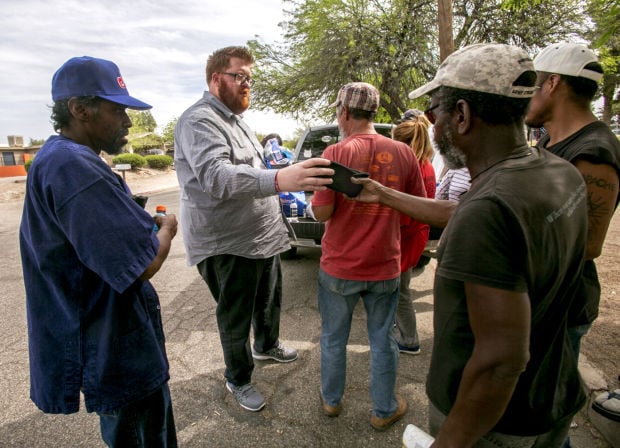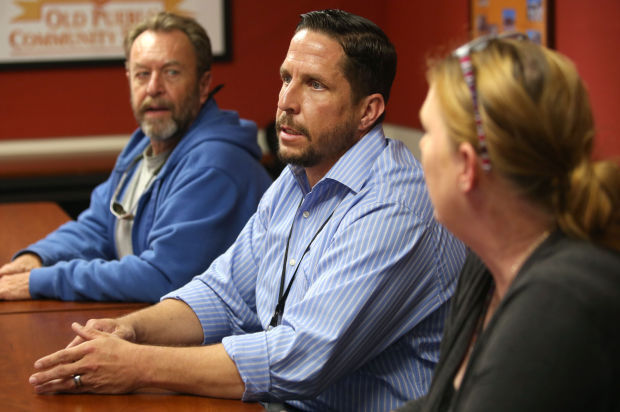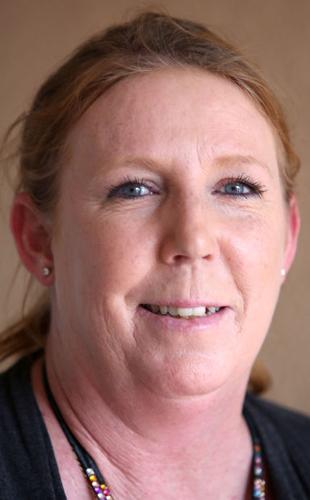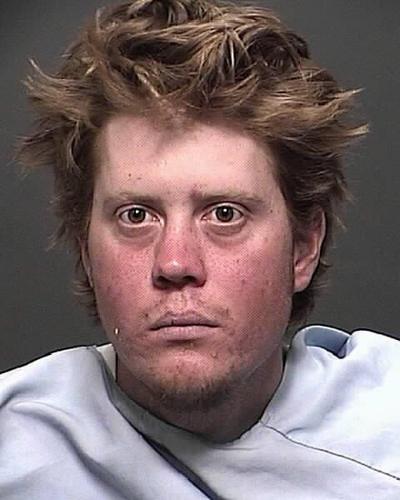As Arizona incarcerates people at an increasing rate, Tucson leaders and social services agencies are working to reduce recidivism.
In 2013, more than 41,000 people were incarcerated in Arizona, compared with about 19,000 sent to prison in 1995, according to a report from the Bureau of Justice Statistics.
The National Institute of Corrections says Arizona incarcerates about 586 adults per 100,000 people, which is a 48 percent higher rate than the national average. It ranks Arizona sixth in incarceration rates per capita, with Louisiana being first with 847 incarcerated adults per 100,000.
Each year, about 13,000 prisoners in Arizona are released, which does not include people released from immigration detention. About 2,000 of those former inmates return to Pima County.
“The vast majority of the people (in prison) are people who are going to come out,” said Tucson Mayor Jonathan Rothschild. “And those people face challenges in housing, health care, family reunification and finding employment.”
Communities have a responsibility to lower the barriers for those who want to succeed after being released from prison, he said.
In response to the growing number of people being imprisoned and subsequently released, Rothschild and federal magistrate Judge Charles Pyle started the Second Chance Coalition in 2012, which aims to create opportunities for those returning to society from prison.
The coalition has two main goals, he said: creating job opportunities for those reintegrating into society after prison and educating them about available resources.
When former inmates return to the community, it doesn’t just affect them, Rothschild said. It also has an impact on poverty, child welfare, public safety and, in the end, the economy.
Last year, the coalition hosted a job fair for formerly incarcerated people at Pima Community College, with more than 30 employers and 600 people in attendance. At least 60 people were hired as a result, he said.
On Thursday, the coalition will host a conference at the Tucson Convention Center featuring national experts, criminal justice officials and community members for a conversation about effective ways to reduce recidivism.
In the Tucson area, more than a dozen agencies offer a range of re-entry programs that provide job training, work placement, housing, counseling and other services.
“Somebody’s got to be willing to give a second chance,” Rothschild said.
STARTING FROM WITHIN
When former inmate Ernie Clark, 35, showed up in Tucson in 2012, he didn’t even have a toothbrush.
“I was really starting over,” said Clark, now a case manager at Old Pueblo Community Services, to which he looked for guidance on getting a fresh start.
The first time Clark went to prison was in 2001, for an aggravated DUI conviction. He said he spent about eight years as a “complete ghost,” addicted to drugs and in and out of jail for petty crimes, including shoplifting. He had no identification card, no job and no hope.
“Every time I walked out that (prison) gate, the dope man was closer than services,” he said.
Then he met the people who changed his life.
Clark was a beneficiary of Old Pueblo’s One Step at a Time peer-mentoring program, which connects inmates about to be released to mentors who help guide them through their transition back to living on the other side of the bars.
After two years on hiatus, the program is starting again, thanks to a federal grant. Over the course of three years, 300 inmates in Arizona Department of Corrections facilities in Tucson, Safford, Perryville, Douglas, Florence and Marana will be paired up with mentors about six months before their release from prison. The mentoring will continue for a year.
All of the chosen inmates will have a higher risk of going back to prison. People who have been convicted of sex offenses or arson charges are not eligible for the program.
The mentors write to the prisoners and connect them to services, including case management, counseling and housing. Most importantly, it’s about giving the inmates someone to help guide them through the process, said Deirdra McMahon, program supervisor of One Step at a Time.
“There are people in prison who do not have anybody,” she said. Having someone, she said, is hope. “And that’s what they need. Hope.”
McMahon, who was Clark’s case manager back then, was one of the people he could turn to as he began his recovery.
“He was a mess,” McMahon said of Clark when he was trying to get his life back together after years of homelessness, heroin addiction and prison.
Clark, who is from Phoenix, moved to Tucson to avoid what he calls “triggers” and “opportunities for failures,” and began receiving additional services through Old Pueblo. He got help in finding shelter, an ID card and, eventually, a job as a cook.
He was then hired as a house manager at Old Pueblo. Now, he’s a case manager specializing in helping veterans with mental illnesses. Outside of his job, he’s a CrossFit fitness coach, a homeowner and a husband.
When asked where he would be if not for the services he received at Old Pueblo, Clark said, “Honestly, dead. Plain and simple. I was a heroin user. Heroin kills people.”
TO GIVE BACK
On a Sunday afternoon, Sam Nagy’s truck bed is filled with bags of personal hygiene items and coolers full of cold Gatorade and bottled water.
Within minutes of pulling up to De Anza Park on North Stone Avenue and East Speedway, about a dozen people at the park gather around the towering 32-year-old social worker, who digs through a blue Walmart bag packed with hygiene products and hands out toothbrushes and other items.
“You want some toothpaste, man?” he asks one of the homeless people standing by.
But this isn’t part of his day gig as a criminal justice liaison and peer mentor for Community Partnership of Southern Arizona.
Nagy collects donations from family members, friends and social services organizations to buy hygiene products, water, socks and food to distribute to treatment centers and sometimes, like this recent Sunday, at parks where homeless people gather.
He calls this effort “Socks 2 Serve” because he first began with socks he bought with a $20 bill his mother gave to him as encouragement. It’s his way of paying it forward, and undoubtedly, a part of his own recovery process.
Nearly a decade ago, Nagy was not in good shape.
Struggling with bipolar disorder and addiction to drugs, jail was often his shelter. And each time, he’d get out of jail homeless, using harsher drugs and prone to more uncontrollable behavior.
“At one point, I lit my socks on fire to see if I could get out of my socks before my feet burned,” he said.
When he was homeless, Nagy said he would go for weeks without changing socks. And when a rare opportunity for a fresh pair of socks came around, he said that brought a “sense of empowerment” — hence the name Socks 2 Serve, for his personal outreach effort.
Dan Haley, CEO of Hope Tucson, mentors Nagy and can attest to how bad his life was. Haley was working at the Community Partnership of Southern Arizona as Nagy went in and out of jail. He said he has seen Nagy go from garbage-bin diving to moving in the right direction in the last 10 years.
“He was a big, strapping, drug-using, unmedicated, mentally ill person,” Haley said of Nagy. “He was young and depraved-looking and out of control.”
After more than a handful visits to jail, Nagy said a judge asked him, “Sam, do you want to go to prison?”
A light bulb came on in his head.
Nagy went through the mental health court and received treatment for his bipolar disorder. Through the help of Community Partnership of Southern Arizona and Café 54, a Tucson restaurant that provides job training for adults recovering from mental illnesses, Nagy said he found a foundation on which he could rebuild his life.
Then, in April 2008, he was hired by Community Partnership to work inside jails as a mentor.
When Haley came back to Community Partnership after 2½ years of absence, he said he was told to go pick up a new employee. He had no idea that the new employee was going to be Nagy, the young man he knew to be addicted to drugs.
“Now he is this well put-together, thoughtful, kind of a lionhearted person who wants to do good,” Haley said. “He works hard one day at a time.”
That lion heart caught the eyes of Nagy’s wife, Jennifer Nagy. She is proud of the way he’s risen above his troubled past to give back to the community. Sometimes, all someone needs to start the process of recovery is to see someone who has done it, she said.
“The people and the places that he goes — they really respect him for it.”









